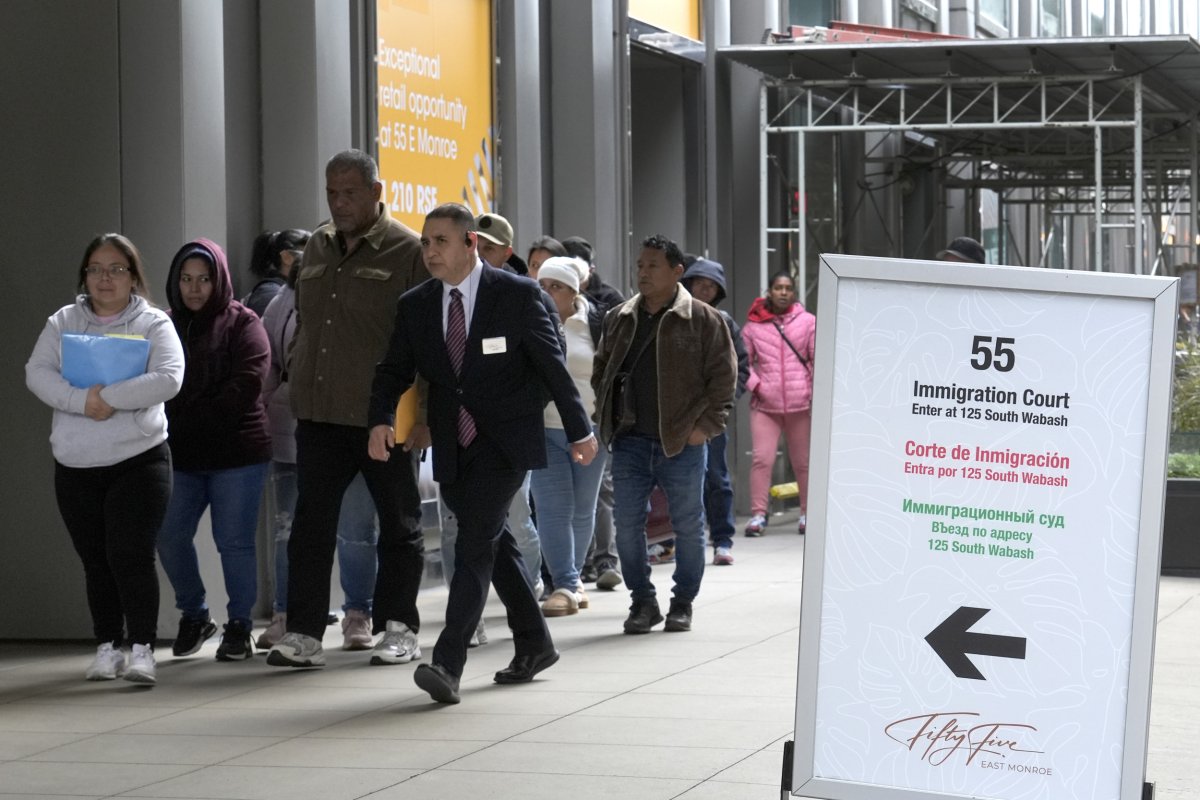After the Trump administration fired 20 immigration judges across the Department of Justice's Executive Office for Immigration Review on Friday, immigration courts are faced with a backlog of more than 3.7 million cases, raising concern about what that means as Trump continues his mass deportation efforts.
Newsweek reached out to the DOJ via email for comment.
Why It Matters
President Donald Trump vowed to conduct the largest mass deportation operation in United States history, targeting the estimated 11.7 million people who are in the country without legal status.
A New York Times/Ipsos poll carried out from January 2 to 10 found 55 percent of voters strongly or somewhat supported such plans. Eighty-eight percent supported "deporting immigrants who are here illegally and have criminal records." Large majorities of Democrats and Republicans agreed that the immigration system is broken.
However, the policy has since sparked concerns about its impact on immigrant communities, families and the economy.
What To Know
The Trump administration has fired 20 immigration judges without explanation across the DOJ's Executive Office for Immigration Review (EOIR), a union official confirmed Saturday to the Associated Press.
Matthew Biggs, president of the International Federation of Professional & Technical Engineers, told the AP that on Friday, 13 judges who had not yet been sworn in and five assistant chief immigration judges were dismissed without prior notice. Two additional judges were fired under similar circumstances earlier in the week.
The sudden firings have since raised concerns about the administration's broader strategy for the country's overwhelmed immigration courts, which are currently facing a backlog of more than 3.7 million cases, according to Syracuse University's Transactional Records Access Clearinghouse.
The EOIR, which runs the immigration courts, oversees 700 judges who each handle between 500 and 700 cases a year, according to Biggs. Most of the cases are related to deportation.

Immigration judges, who operate within the DOJ's administrative court system, play a critical role in deciding asylum claims and determining who should be removed from the country.
While it is unclear how exactly firing the judges will impact the backlog of immigration cases, immigration attorneys expect them to take longer than usual despite the system already taking years for some cases.
Immigration attorney LaToya McBean Pompy of McBean Law firm said in a video posted to TikTok that firing immigration judges means slower cases and dockets.
"I'll tell you what this means. It means that a whole lot of people will get a chance to stay here a lot longer. That's what this means: fewer judges mean slower cases, slower dockets, people will linger on dockets longer, and they will get to stay here longer," she said.
Newsweek reached out to the McBean Law Firm via online form for comment.
Immigration attorney Allen Orr said during a Monday interview with NBC News that firing judges will mean asylum cases could take years.
"Due process and humanity is under attack, and what we are doing is not meeting the needs of the people by saying we want more judges, but we are going to fire these judges because now I don't know anyone who wants to be an article 2 judge because you can be removed by the legislator," Orr said.
"So in a regular fiscal year, you are looking at around 4 to 5 years for an asylum case, and that is not even speaking about the new asylum cases that are going to be filed by the end of TPS," he said.
While both Republicans and Democrats have said they support more judges and staff to address these immigration cases, concerns remain after Trump's first term saw significant pressure on immigration judges to speed up case decisions.
"Removing the judges and then at the same time asking Congress for more money to hire additional judges sends a very confusing message about really being serious about enforcement," Orr added.
Trump terminated four top EOIR officials on his first day in office, including chief immigration Judge Sheila McNulty, the acting director of the Executive Office of Immigration Review, Mary Cheng, the office's general counsel, Jill Anderson, and its head of policy, Lauren Alder Reid.
Following those cuts, the current leader, Sirce Owen, has since reversed several Biden-era policies, including a DOJ initiative that provided financial support for nonprofits assisting individuals facing deportation. That funding was temporarily halted last month before being reinstated following legal action from a coalition of advocacy groups.
The firings come as part of a broader effort by the Trump administration to shrink the federal government. On Thursday, agencies were ordered to lay off nearly all probationary employees who had not yet secured civil service protections—potentially impacting hundreds of thousands of workers. Probationary employees are typically those with less than a year on the job.
What People Are Saying
Kerry Doyle, a recently appointed immigration judge who was one of the judges fired, Saturday on LinkedIn: "This firing occurred despite the fact that the Immigration Court currently has in the neighborhood of 3.5 MILLION pending cases and DOJ is asking Congress for more money to hire more people at EOIR! (Hint: don't fire the people you already have!).
"This firing occurred despite the fact that among my peers in my court, I had the longest and most extensive experience in immigration law and had served both as a defense counsel representing immigrants, but also as the top immigration prosecutor as PLA with ICE."
Matthew Biggs, president of the International Federation of Professional & Technical Engineers, said per NBC News: "There's bipartisan support across the board to actually hire more immigration judges. I mean, there's a backlog of almost 4 million cases as it is, so this administration, with these firings, they've been very successful in increasing the backlog."
Retired immigration judge James Fujimoto told NBC 5 Investigates that the word "overwhelmed" accurately describes the situation: "It's a very fair word, absolutely. I find it hard to believe that you could fix this without some type of legislation because, as I said, otherwise, you just keep going back and forth. One party does this - here's my executive order – the other party comes in and says, I'm canceling that."
What Happens Next
While it is unclear if the fired judges would be replaced, cuts to federal government spending, including more layoffs, are expected to continue across other agencies.
Meanwhile, the backlog of immigration cases is expected to continue as Trump ramps up his mass deportation efforts.
fairness meter
About the writer
Natalie Venegas is a Weekend Reporter at Newsweek based in New York. Her focus is reporting on education, social justice ... Read more



